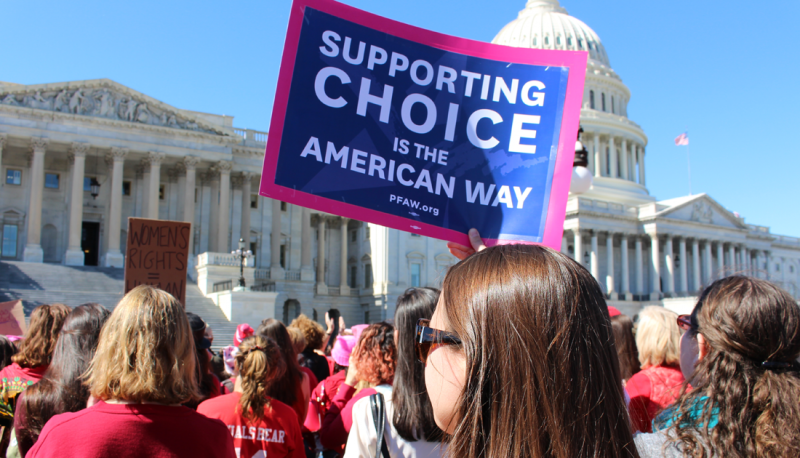The Supreme Court heard oral argument this morning in Dobbs v Jackson Women’s Health Organization, which threatens to overturn the precedents established by Roe v Wade and Planned Parenthood v Casey and eliminate the constitutional right to choose an abortion. The Mississippi law in question bans abortions almost completely after 15 weeks of pregnancy, long before viability. Even if the far-right majority does not explicitly overrule Roe, upholding the Mississippi law would devastate the right to choose and our reproductive freedom.
It is impossible to accurately predict just how the Court will rule based on oral arguments. But the hearing produced some troubling signs.
Mississippi’s solicitor general Scott Stewart began his argument by explicitly urging the Court to overturn Roe, which he claims “haunts” our country and has “no basis” in the Constitution. Progressive justices Stephen Breyer, Elena Kagan, and Sonia Sotomayor strongly pushed back, emphasizing the importance of respecting established precedent (known as the principle of stare decisis) and how problematic it would be to overturn Roe after fifty years and numerous decisions reaffirming it and Casey. As Justice Sotomayor put it, the record shows that Mississippi had passed the law in large measure because there are “new justices” now on the Court, and it was questionable whether the Court could “survive the stench” of what would clearly appear to be a “political” choice to overturn these past precedents. Even Justice Brett Kavanaugh raised a concern about the Court appearing to go “back and forth” on such matters.
Justice Clarence Thomas and Samuel Alito had previously urged that these decisions be overturned, and their comments were true to their extreme beliefs. Thomas continued to stress that the right to an abortion was not “written” in the Constitution, and suggested that reliance on its protection of “liberty” was insufficient. Justice Alito suggested that it could well be acceptable to overturn past decisions that were “egregiously wrong”, as when the Court overruled the Plessy case in Brown v Board of Education, that “viability” is an arbitrary line since the fetus has an interest in life both before and afterwards, and that factors like pre-constitutional history and state laws and practices did not support a constitutional right to abortion. Solicitor General Elizabeth Prelogar and the Center for Reproductive Rights’ Julie Rikelman, who argued against the restrictive state law, ably countered those arguments. For example, Prelogar pointed to strong historical evidence that the right to terminate a pregnancy was protected by the common law at the time the Fourteenth Amendment was adopted.
Most of us listening were hoping for clues from the four justices who have not voted on Roe but appear to be or have been restrictive on abortion: Justices Kavanaugh, Neil Gorsuch, and Amy Coney Barrett, as well as Chief Justice Roberts. While it remains unclear how far they will go, it unfortunately appears likely they will at least uphold the Mississippi law and severely restrict reproductive rights. Specifically:
Despite his “back and forth” comment, Kavanaugh favorably referred to the state’s position that the constitution and the Court are and should be “silent” and not be “pro-life” or “pro-choice,” and that the Court had previously overturned numerous past precedents on unrelated matters. Chief Justice Roberts seemed clearly to be looking for a way to cut back abortion rights without openly acknowledging that would mean overturning Roe, suggesting that, for example, the Court could allow abortion up until 15 weeks rather than until viability, an idea vigorously argued against by Rikelman and Prelogar. Gorsuch and Barrett both suggested it would be possible to uphold the state law without explicitly overturning Roe but were unclear about what could replace viability as a standard. Barrett pushed back on arguments that the right to abortion is important to advancing women’s rights, suggesting that the “burden” of parenting could be dealt with by adoption and safe haven laws. Prelogar and Rikelman strongly responded, pointing to evidence that especially in states like Mississippi, childbirth itself can be dangerous to a woman’s health under many circumstances. They carefully explained the importance of Roe not only to reproductive and other constitutional rights, but also to the continued economic and social progress of women in our country.
We will likely not learn until June how the Court decides the Dobbs case, but the records and comments of the Court’s six-person restrictive majority indicate serious cause for deep concern. And we still have not heard from the Court as to whether it will even allow a general challenge to the even more restrictive Texas law that bans abortions after six weeks. The outlook for reproductive rights on the Supreme Court is deeply troubling, making it all the more important that people do what they can to promote fair-minded judges and protect our rights.

